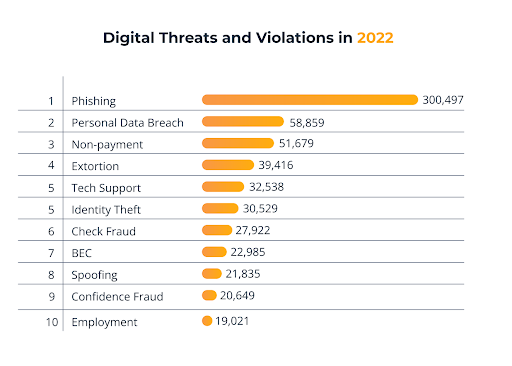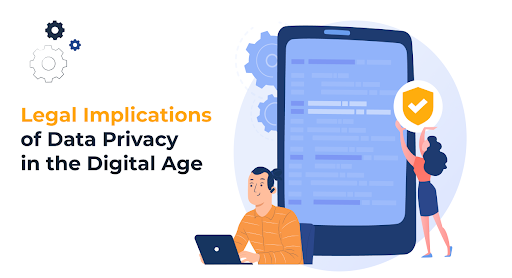In an age where your digital footprint is as real as your physical one, it’s not a question of if someone will compromise your data, but when. Imagine waking up one day to find your bank account emptied, your social media accounts hijacked, or your personal information sold to the highest bidder. Sounds like a nightmare, right? Well, in 2023 alone, the average cost of a data breach globally was a staggering USD 4.45 million based on an IBM report. In this article, we will dive deep into the legal landscape of data privacy, break down the risks, and offer solutions. So, why should you care? Because law isn’t just for lawyers; it’s for anyone who clicks, taps, or swipes.
Table of Contents
ToggleThe Rise of Digital Threats and Violations of Data Privacy

Statista says that in 2022 alone, phishing scams duped over 300,000 individuals, and personal data breaches affected nearly 59,000 cases. Let’s decode the types of threats you face daily.
1. Phishing- Data Privacy in the Digital Age
Phishing is the digital equal of impersonation. It often involves fake emails or messages asking for sensitive information.
The number affected: 300,427 individuals fell victim in 2022.
Phishing is evolving to include targeted SMS scams (smishing) and business-related scams (BEC). Beyond trickery, phishing can lead to data breaches and even the spread of ransomware.
2. Personal Data Breach- Data Privacy in the Digital Age
It’s about unauthorized individuals’ access and stealing personal data.
The number affected: 58,859 cases in 2022.
3. Non-payment / Non-delivery
This threat is about ordering a product online and never receiving it or selling something and not getting paid.
The number affected: 51,679 individuals experienced this issue in 2022.
Extortion
Extortion is a threat to release private information unless one receives payment.
The number affected: Over 39,416 cases in 2022.
4. Tech Support Scams

Fake ‘technicians’ trick users into believing there’s an issue with their device and charge for unnecessary services.
The number affected: About 32,538 individuals fell for such scams in 2022.
5. Identity Theft- v
Identity theft is when someone uses your personal information to commit fraud The 3 main types of identity theft are medical, financial, and online..
The number affected: 27,922 cases in 2022.
6. Other Scams- Data Privacy in the Digital Age
These include credit card/check fraud, BEC, spoofing, confidence fraud, employment scams, harassment, and real estate scams.
One cannot overlook the Equifax breach of 2017, which exposed the personal data of 147 million Americans. This incident serves as a stark reminder of the vulnerabilities in our digital systems and the legal repercussions that can follow. Companies that fail to protect consumer data can face severe penalties from governmental bodies and in the court of public opinion. In the case of Equifax, the settlement amounted to more than $425 million.
Legal Protections in Place for Data Privacy and Security
Ignorance of the law is no excuse, especially when it comes to your data privacy. Here’s a rundown of the laws designed to protect you.
Overview of U.S. Laws and Federal Privacy Regulations
Data privacy is a global issue, and different countries have their approaches. From Europe’s GDPR to Brazil’s LGPD, let’s see how the U.S. compares on the international stage and what it means for your data.
Privacy Act of 1974
This act focuses on how federal agencies handle and use personal data.
Main points:
- Federal agencies cannot disclose personal details without written consent, with a few exceptions.
- Individuals have the right to access and change their records.
- Federal agencies can only share personal details with written permission if there’s a valid exception like statistical analysis by the Census Bureau.
The Privacy Act can hit agency officials with a misdemeanor and a fine of up to $5,000 for willfully mishandling personal records. If charged, individuals may need to consider bond vs bail options to secure their release while awaiting trial. A court will determine the amount of bail in this case.
Health Insurance Portability and Accountability Act (HIPAA)
HIPAA sets data security regulations for healthcare providers on using patient’s health information.
Main points:
- This applies only to “covered entities” like doctors and insurance companies.
- Patients have the right to view and correct their health data.
- Doctors can only share health information with the patient’s written consent.
Fines range from $100 to $50,000 per violation, with a maximum annual penalty of $1.5 million Also, HIPAA violations can lead to jail time: 1 year for ignorance, 5 years for false claims, and 10 years for malicious intent.
The Gramm-Leach-Bliley Act (GLBA)
GLBA covers the Data Privacy Act for financial institutions.
Main points:
- Institutions must protect sensitive data and explain its usage to customers.
- Financial institutions must inform customers how their financial data is used and ensure it’s safe from threats.
Under GLBA, companies can face fines of up to $100,000 per violation. Criminal penalties can even lead to 5 years in prison and loss of licenses.
Children’s Online Privacy Protection Act (COPPA)
COPPA covers the collection of data from children under 13.
Main points:
- Companies must have a clear online policy and get parental consent before collecting data from children.
- Parents can access and delete their child’s data.
- Websites targeting children need parental permission and should protect the child’s data.
COPPA violations can result in civil penalties of up to $50,120 for each breach.
California Consumer Privacy Act (CCPA)
CCPA covers personal information collected by businesses about consumers.
Main points:
- Consumers can know what personal data a business has and who it’s shared with.
- They can ask to delete their data and refuse its sale.
- California-based companies must inform consumers about the data they collect and offer options for its deletion.
- CCPA’s primary concern is commercial activity, not individual residency.
CCPA fines can go up to $7,500 for intentional violations and $2,500 for unintentional ones.
Also, various states like Virginia, Colorado, Connecticut, and Utah are planning to introduce comprehensive data privacy laws.
While these laws offer some protection, they are far from perfect. For instance, the U.S. still lacks a unified national data privacy standard, unlike the GDPR in Europe. The legal landscape is a patchwork that needs stitching.
International Comparison: The Legal Basis of Data Privacy
Here, we’ll break down the legal foundation of data privacy by examining four major laws from different parts of the world.
European Union’s General Data Protection Regulation (GDPR)
Implementation Year: 2018
- Scope: All EU member states and has extraterritorial applicability to companies processing EU citizens’ data.
- Key Provisions: Users have the right to access and control their data. Companies need explicit consent for data processing. The GDPR mandates data breach notifications and introduces the role of a Data Protection Officer (DPO).
- Fines: €10-20 million or 2-4% of annual global turnover, whichever is higher.
- Unique Aspects: The GDPR is for its extraterritorial reach, affecting all businesses interacting with EU residents.
Brazil’s General Data Protection Law (LGPD)
Implementation Year: 2018
Scope: Brazil, with a narrower extraterritorial reach than the GDPR.
Key Provisions: Much like the GDPR, individuals have control over their data and need explicit consent for processing. The law mandates data breach notifications.
Unique Aspects: The LGPD established the National Data Protection Authority (ANPD) for enforcement and introduced requirements for a legal foundation to process sensitive data.
Singapore’s Personal Data Protection Act (PDPA)
Implementation Year: 2012
Scope: Singapore, covering both private and public sectors.
Key Provisions: Emphasizes consent, data accuracy, transparency, and individual rights. The PDPA also features a Do Not Call (DNC) registry.
Unique Aspects: Organizations with significant data processing activities must appoint a Data Protection Officer (DPO).
Australia’s Privacy Act- Data Privacy in the Digital Age
- Implementation Year: 1989
- Scope: Australia, applying to government agencies and specific private sectors.
- Key Provisions: The Act covers data collection, use, and disclosure while granting individuals the right to access and correct their data.
- Unique Aspects: Unlike GDPR and CCPA, there’s no mandatory data breach notification rule in the Privacy Act.
The GDPR in the EU and LGPD in Brazil are setting global standards. However, gaps remain, especially in countries with less stringent regulations. The key takeaway? Always know the data laws of the country you’re dealing with.
Also Read: How To Sell Logo Design Services Online
The Role of Organizations and Individuals in Data Collection Privacy
Data privacy isn’t just a corporate or individual issue; it’s a shared responsibility. Companies have legal obligations, but you also have a role to play in protecting your data. Let’s explore how you can be a proactive guardian of your own digital life.
Corporate Responsibilities: Consumer Privacy Law and Data Collection
Companies hold a lot of personal data, and they have a big responsibility to keep it safe. Laws tell them what the smallest safety standards are, but good companies aim to do even better than that. For example, some laws say companies must tell you what data they collect and how they use it. But good companies don’t just do this because they have to; they do it to earn your trust.
Also, companies should only collect the data they need. This makes it less likely that your data will get stolen. And if a company does mess up, the penalties can be huge. Under some laws, a company could lose 4% of all the money it makes in a year. And in the case of the intentional distribution of personal data, responsible persons may even receive jail terms.
As new tech comes out, the laws will change, and companies need to keep up. So, keeping your data safe isn’t just about following laws; it’s about doing the right thing. And doing the right thing helps companies earn your trust and stay successful in the long run.
Individual Responsibilities: Safeguarding Online Privacy Rights
You also have a role in keeping your data safe online. Sure, companies need to protect your information, but you can take steps to help. For instance, use strong passwords and change them often. Don’t use the same password for everything; if one account gets hacked, the others will be at risk too.
Two-factor authentication is another good way to add an extra layer of security. This usually means you’ll get a text or an app notification to confirm it’s you trying to log in.
Be careful what you share online, especially on social media. The more you post, the easier it is for someone to steal your identity or trick you into revealing more.
Remember, you’re not powerless. You can take steps to protect your data. And the more you know about your rights, the better you can make sure companies are treating your data the way they should.
Also Read: 5 Internet Security Measures You Should Apply Today to Protect Your Business
The Future of Data Privacy in the Digital Age
The digital age is changing how we think about privacy. The laws will follow along with this. Let’s take a look at possible shifts in the near future.
Predictions on Legal Evolution- Data Privacy in the Digital Age
Here’s what the future might hold for data privacy laws:
1. Global Laws on the Rise
By 2030, most of the world will have some kind of privacy law. This could lead to more uniform rules across countries.
2. Trust is Key
As data breaches increase, laws will focus more on making companies transparent and accountable.
3. Tech Changes, Laws Follow
New techs like AI and IoT will force laws to adapt quickly.
4. User-Friendly Privacy
Laws may require companies to build products that make data privacy easy to understand.
5. U.S. Laws Could Unify
The U.S. has a mix of state and industry laws. This could change to a single national standard like Europe’s GDPR.
6. Tougher Penalties
Expect stricter fines and penalties for breaking these laws.
7. Companies as Privacy Champions
Businesses will help shape these laws, driven by their need to earn customer trust.
Expect more global laws, stricter penalties, and companies playing a larger role in shaping data privacy regulations. The challenge lies in creating laws that are as dynamic as the technologies they aim to regulate.
Emerging Technologies: Risks and Solutions
Emerging technologies offer a world of possibilities but come with their own set of challenges, especially on data privacy. Here are some of the main concerns and solutions:
Risks of Emerging Technologies
- Privacy and Data Misuse: There’s considerable uncertainty about how these new technologies handle personal information.
- Security Concerns: Concerns revolve around the sharing of sensitive data across IoT devices and the vulnerabilities introduced by mobile payments and cloud-based platforms.
- Biased Technologies: A significant challenge is the inherent biases present in technology.
Solutions to Counteract the Risks- Data Privacy in the Digital Age
- Decentralized Identity Management: Businesses can distribute digital identities across various systems using technologies like blockchain.
- Cloud Infrastructure Entitlement Management (CIEM): Tools in this realm track identities and permissions over the cloud.
- Secure Access Service Edge (SASE): This focuses on creating a dynamic security architecture that evolves according to need.
- Passwordless Authentication: By employing methods like biometrics and facial recognition, users can gain access without the conventional password.
- Ethical AI: Creating algorithms that prevent skewed outcomes and building training data sets that avoid traditional human prejudices.
Blockchain, ethical AI, and decentralized identity management are some of the solutions in the pipeline. But remember, technology is a double-edged sword; it can protect you or harm you.
Summary of Data Privacy in the Digital Age
Data privacy is complex and affects us all. In the digital age, rising threats like phishing and data breaches cost an average of $4.45 million per incident. While U.S. laws like HIPAA, GLBA, and CCPA impose fines and jail time for violations, the U.S. still lacks a unified national data privacy standard like Europe’s GDPR. Current laws are a start, but they need to keep up with tech changes. The goal is to balance innovation with the right to privacy.
Interesting Reads:
Creating Terms Of Use For Your Online Community
How to Protect Your Online Marketplace from Fraud and Scams?








